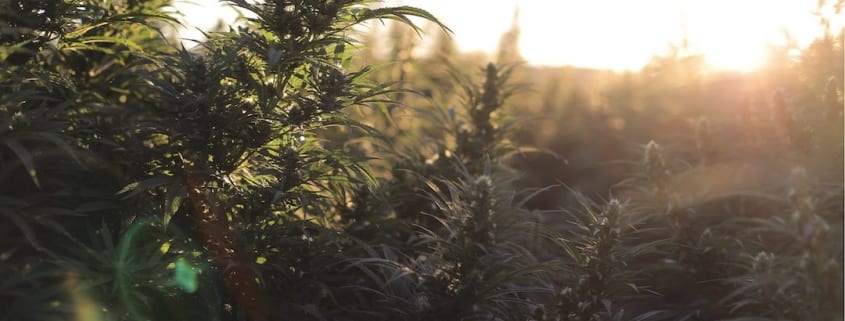Ever since the 2018 Farm Bill relaxed restrictions against hemp farming, you’ve heard all about the big profit potential of this versatile crop. In fact, a research report by MarketsandMarkets™ found that the industrial hemp market is expected to grow from $4.6 billion in 2019 to $26.6 billion by 2025. Researchers from Brightfield Group have also estimated that farmers could earn up to $40,000 per acre of industrial hemp compared to just $1,000 per acre of corn. While the higher end of that range may be achieved by more experienced growers, if even a tenth of that number sounds good to you, then you may be wondering how you can start growing hemp for profit.
Hemp, like all crops, has its unique growing challenges. One of those challenges is that hemp farming in the U.S. was illegal for decades, meaning that accurate knowledge and experience are in short supply.
Is it profitable to grow hemp? If you are looking to cultivate cannabidiol (CBD) oil or cannabigerol (CBG) oil, the answer can be a resounding yes if you follow best practices. Here are 10 invaluable tips on how to grow hemp for profit.
1. Prepare, Prepare, Prepare!
As with any crop, growing hemp requires a big investment in time, money, and effort. Before you put all your resources on the line, make sure you know what you’re jumping into.
Start by:
- Researching hemp: Learn everything you can about it, including its growing cycle, nutritional needs, cultivation, and the different hemp strains available on the market.
- Get advice: Reach out to farmers in your area who are growing hemp for profit and learn about their experience. You can also find great communities of hemp farmers online who are willing to share advice.
- Create a business plan and budget: Where will you plant your hemp crop? How many seeds will you plant? How much will you spend on seeds? Will you invest in any specialized equipment? You’ll need to answer these questions and many more before you plant your first hemp seed.
- Start small: Instead of risking it all by converting your entire acreage to hemp, consider planting just a few acres your first year. This will give you the time and space to learn about hemp and to see how the crop does on your farm before you invest a significant amount of capital.
2. Choose a Profitable Product
Hemp is a highly versatile crop that can be farmed for a variety of different products. You can farm hemp for fiber, grain, CBD oil, CBG oil, smokable flower, and more. Certain hemp products are more profitable than others. For instance, CBD oil can be very profitable and, on the premium end, can sell for more than $1000 per kilogram.
To make the most profit from your hemp crop, consider farming for the purpose of CBD oil, or even CBG oil. CBG oil is still relatively unknown, but early studies of the substance have shown that the oil may offer positive health benefits. Some industry experts are predicting CBG could be the next big health product, and it currently sells for an even higher price than CBD oil.
3. Choose Hemp Seeds Designed for Your Purpose
Search out hemp seeds designed to enhance the production of the product you’ve chosen to cultivate. For example, some seeds have been intensely crossbred to enhance the production of CBD oil. Planting these specialized seeds will allow you to produce more pounds of CBD extract per acre. That could translate into an increased profit of hundreds, possibly even thousands, of dollars per acre you plant.
At High Grade Hemp Seed, all our hemp seed strains, including industry favorites Berry Blossom and Cherry Wine are designed to produce high quantities of CBD pill. Our newest product, Matterhorn CBG was bred specifically to increase production of CBG oil and can produce up to 15% CBG per trimmed flower.
4. Choose the Right Hemp Seed Strain
Before you spend a lot of money on your first purchase of hemp seeds, consider what strain will be the most profitable for you. Most hemp seed companies provide a variety of hemp seed strains. Each strain offers unique benefits. Some are designed for specific growing conditions, others for particular climates, and some are designed to grow fast or grow in a particular season. Many strains also produce interesting flavors. Some drip in resin for extraction and some are bred for the aromatic flowers to be smoked and appreciated by CBD consumers.
Research all the different strains available, and don’t be afraid to ask seed companies for their recommendation based on the particulars of your farm and your goals.
5. Buy Feminized Seeds for CBD and CBG Production
Here’s a quick lesson in hemp plant biology. Hemp plants can be male, female, or hermaphrodites. CBD oil and CBG oil come from the flowers of female plants, which means the females are your ticket to a profitable hemp crop.
Male hemp plants can actually burn away your profit. Not only do they produce only minimal amounts of CBD oil (not even enough worth cultivating), but when they pollinate female plants, the females produce less CBD.
Therefore, it’s critical that you keep male hemp plants out of your fields. Even a few males can pollinate many of your females and dramatically lower your CBD or CBG yield. The best way to get as many female hemp plants as possible is to invest in feminized seeds. Reputable hemp seed sellers can guarantee an extremely high rate of feminized seeds (at High Grade, we’ve achieved a 99.8% rate of feminization), which will result in a high rate of CBD or CBG oil extraction.
6. Invest in Seeds with a High Germination Rate
Every hemp seed that doesn’t germinate represents the loss of potential income. Even if a small percentage of your hemp seeds don’t germinate, that could mean hundreds of dollars of loss per acre.
When you’re ready to invest in hemp seeds, ask for the germination rates for your seeds. A reputable seed company should not only have this information available, but they should also be proud to tell you. At High Grade, our collective germination rate for all our hemp seed strains is over 95%.
7. Diversify Your Products
Farmers understand the value in diversifying their crops. A variety of different crops can help you manage changes in the marketplace, extreme weather events, and even changing consumer sentiments. Even within the hemp industry, you can diversify your hemp crop to balance out risk.
For example, even if your main interest lies in producing CBD extract, you may want to set aside a few acres for a seed like Matterhorn CBG to try out CBG extract. If CBG becomes as hot of a commodity as CBD, then you could be one of the first farmers to market. Plus, the reliably low THC levels, even when left in the field, ensure you have a compliant harvest.
You may also want to experiment with different hemp seed strains. You may find that one strain grows better and produces more CBD extract for you. Additionally, different strains will produce CBD with unique palettes, which may attract different buyers for your crop.
8. Consider Using Hemp Plant Starts
Hemp seeds are best grown initially in a greenhouse for their first few weeks. If you don’t have a greenhouse infrastructure and want to avoid that rather large initial investment, consider buying hemp starts. Hemp starts are already germinated and develop a tap root – unlike clones which do not develop a tap root,, which means you don’t have to worry about seeds that fail to germinate or high wind conditions causing seeds to blow away. Every start is a plant already on its way to flowering in a few short weeks.
9. Hire an Expert
If you’ve never farmed hemp before, you may want to consider hiring an agronomist. Though an experienced and knowledgeable agronomist won’t be cheap, their services will help ensure that your crop is successful. The increase in profits, when all is said and done, should more than pay for their services.
An agronomist can help you:
- Test and prep your soil to make sure it is conducive to hemp growth
- Recommend the right equipment to grow and harvest your crop
- Advise you on the best irrigation methods and systems
- Help you design your rows for maximum cultivation
- Provide localized advice on regulations, certifications, licensing, and testing requirements to keep you legally safe
You may also want to consider working with an attorney experienced with hemp law to ensure you are following all local, state, and federal regulations.
10. Ask Questions
Finally, don’t be afraid to ask lots of questions. Starting to farm a new crop is a big investment, no matter the crop, so arm yourself with as much knowledge as possible. Talk to all the hemp farmers you know. Grab the ear of companies that manufacture specialized hemp farming equipment. Contact the top hemp seed companies and talk to their customer representatives. Tell them about your farm and goals, and ask for recommendations on the right seeds. Seed companies should be happy to answer your questions and to give you advice on how to grow hemp for profit.
Is It Profitable to Grow Hemp?
Yes, it is. We work with many farmers across the country who have been able to make a good living through hemp farming. Growing hemp isn’t easy, and success is far from guaranteed, but now you know some of the best tips on how to grow hemp from profit. If you start with the right principles, perform good planning, order the best seeds, and invest in expert advice, we think you’ll find hemp farming to be a profitable endeavor.
We want to answer your hemp seed questions and help you earn the most from your first hemp harvest. Contact us today.



 High Grade Hemp Seed
High Grade Hemp Seed